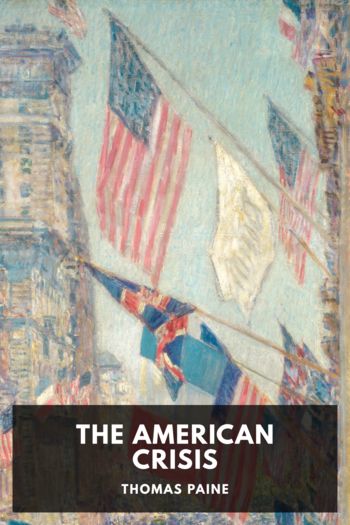Fateful Lightning: A New History of the Civil War & Reconstruction, Allen Guelzo [best thriller novels of all time txt] 📗

- Author: Allen Guelzo
Book online «Fateful Lightning: A New History of the Civil War & Reconstruction, Allen Guelzo [best thriller novels of all time txt] 📗». Author Allen Guelzo
Johnston arrived at the army’s winter encampments around Dalton, Georgia, on December 27, 1863, and what he found there was not encouraging. The Army of Tennessee had 70,000 men on its rolls, but only 36,000 actually present for duty, and a critical shortage of horses hobbled the cavalry, artillery, and wagons. By the end of April, however, Johnston had successfully reorganized the army, called in furloughs, distributed amnesties to deserters, and scraped together enough reinforcements to swell the Army of Tennessee back up to 53,000 men, with calls out for another 14,000 from Georgia’s coastal garrisons and local militia. This still gave Sherman a three-to-two edge over Johnston, and so Johnston decided that the best campaign would be a defensive one, using the mountains, ridges, streams, and gaps of northern Georgia to stymie Sherman’s advance at every step and forcing him to waste time and thin out his supply line. It escaped Johnston’s notice that this was a formula largely designed to lose, even if the loss was a slow one.50
Defensive warfare, however, was Joseph Johnston’s long suit, and from the moment Sherman’s army clanked out of Chattanooga on the roads toward Atlanta until the middle of July, Johnston and the Army of Tennessee tick-tacked across northern Georgia as if it were a gigantic chessboard, holding defensive positions Sherman dared not attack, waiting for Sherman to waste time maneuvering around them, and then slipping back to a new position just as Sherman was about to spring the trap. On June 27, seething with frustration, Sherman risked an all-out frontal attack on Johnston’s positions on Kennesaw Mountain. In two hours Johnston’s men mowed down 3,000 Federals, and Sherman went back to the chessboard war. It took Sherman until the middle of July to cover the 120 miles that separated Chattanooga from Atlanta, and when at last the Federal army arrived there, it found Johnston securely entrenched around the city, waiting for Sherman to commence a lengthy and futile siege.51
Sherman, with a vulnerable 300-mile-long supply line stretching back through Chattanooga to the Ohio River, could not easily afford such a siege. He “did not fear Johnston with reinforcements of 20,000 if he will take the offensive,” but so long as Johnston was safely cooped up inside Atlanta, Nathan Bedford Forrest’s cavalry, now based as an independent command in northern Mississippi, could easily slip northward into Tennessee and slice Sherman’s jugular in half-a-dozen places. Sherman tried to forestall the threat of such a raid by dispatching Brigadier General Samuel Sturgis and 8,100 cavalry and infantry to find and destroy Forrest. But Forrest, with no more than 3,500 men, found Sturgis first at Brice’s Crossroads, and on June 10, 1864, Forrest routed Sturgis’s men, capturing most of Sturgis’s artillery, 176 wagons full of supplies, and 1,500 prisoners. “The panoplied and militant host of Sturgis consumed nine days in the march from Memphis to Brice’s Cross-Roads,” smirked one satisfied Confederate, “but, with Forrest on its trail, what was left of that host covered the same distance on the return in two nights and one day.” If Forrest could now get loose on Sherman’s supply lines while Sherman was bogged down in front of Atlanta, Sherman would have no alternative but to withdraw back into Tennessee, and the last prop of Grant’s great offensive would collapse. 52
At this moment, however, Jefferson Davis stepped in to present Sherman with an unlooked-for gift. However successful Johnston’s campaign might have seemed as a defensive operation, it appeared to Davis, who had no incentive to think well of Johnston in the first place, as though Johnston was performing nothing more than a halfhearted retreat when the object of the war in the west was to push the Federals back into Tennessee. So on July 17 Davis abruptly relieved Johnston and turned the Army of Tennessee over to John Bell Hood. No one could have been more the opposite of Johnston, both temperamentally as well as professionally. Hood had spent most of the war in the Army of Northern Virginia, commanding a brigade of Texans whom he happily and recklessly threw at whatever Union position lay before him. Personally brave to a fault, Hood knew nothing of caution, and one of Sherman’s scouts (or one of his colonels, depending on the version of the story) recalled seeing Hood bet $2,500 in a poker game “with nary a pair in his hand.” In 1863, he had lost the use of his left arm while leading his men at Gettysburg, and three months later, as part of Longstreet’s corps at Chickamauga, lost his right leg to a bullet while personally leading his men into the teeth of Federal fire.
Aggressiveness like that was just what Davis wanted for the Army of Tennessee, and since Hood was still on the spot in Georgia, it seemed only natural to give the army to Hood to be sure something would be done with it. Not a little of that conclusion was helped by Hood’s own ambitious backstabbing of Johnston. “Here is Gen. Joseph E. Johnston’s reward for shielding his soldiers and inflicting losses in Gen. Sherman’s army until his own little army could successfully offer battle and turn back the advancing hosts of Sherman’s invaders,” Douglas Cater complained. “This change of commander… had an effect on the





Comments (0)